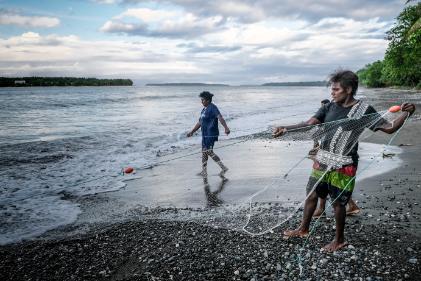Coastal fisheries are crucial to the health and well-being of many communities. So, it's important that these resources are managed sustainably. The Australian National Center for Ocean Resources and Security or ANCORS at the University of Wollongong offers education and training on ocean law, Fisheries Policy and management. Carly Hammonpo went to Vanuatu to find out how ANCORS work in close partnership with national fisheries agencies in the region.
[Music]
Carly, reporter: Coastal fisheries are an important source of food income and cultural identity for Pacific Islanders traditional practices are still used extensively by coastal communities throughout Vanuatu.
Chief Robbie Peter, Chief of Takara Village: We use customary governance to establish tabu areas. These discourage people from poaching resources in those areas where fishing restrictions have been placed. Coastal resources are important to my community. We want to sustain our livelihood and put food on our plates.
Carly, reporter: Takara Village is two hours north of the capital of Port Vila. In 1980 Vanuatu gained independence and ownership of the land including coastal reefs were returned to customary land owners.
Tuba Eria have worked well to maintain their coastal fisheries. However, rapidly changing conditions over recent decades has pushed communities to look for other practical and innovative solutions.
Chief Robbie Peter, Chief of Takara Village: Community-based fisheries management (CBFM) respect our ownership rights. Our customary tribal rights and practices remain intact. We want to work together with the government because they have regulatory strategies that can help us to sustainably manage our resources at another level.
Carly, reporter: Pita Neihapi works face to face with the coastal communities as part of the Pathway project, a region project led by the Australian National Center for Ocean Resources and Security. He knows only too well the challenges of developing and implementing sustainable practices.
Pita Neihapi, CBFM Officer (Pathway Team Leader), Vanuatu Fisheries Department: At the moment with this fish coming to the market, it would put pressure on the resources. It put a lot of pressure in terms of sustainability. So this is where CBFM comes in to help them to raise awareness about sustainability of resources in the community so that they can get ownership to manage the resources more wisely and to sustain this activity into the future.
Carly, reporter: Using this fish market to centralize operations and regulate the domestic fish trade industry is key to creating sustainable practices and providing higher quality products.
Pita Neihapi, CBFM Officer (Pathway Team Leader), Vanuatu Fisheries Department: At the moment we're trying to have a smooth transition of rotating sales to the central market. We are talking about maintaining the quality of fish from the communities right down to the market. The long term plan here is to enable communities to sustainably harvest the fish.
Carly, reporter: Collecting data is vital to understanding the diverse challenges the fishing communities face. Anecdotal evidence as well as logbooks and fish measuring mats are used to record fish data. Developing further tools is in the pipeline.
Lucky Joy, Principal Data Officer (National), Vanuatu Fisheries Department: Coastal fisheries is always a very challenging area to collect fish data. Every day fisherman are fishing. Canoe fishing, fishing or cleaning on the reefs, capturing that information is a challenge. So, we're looking at some tools that can be able to capture that information. What type of communities are harvesting? What is their main target species? What fish they're eating? Are they're selling their fish? And then that gives you as the government the basis of where they can be able to support and what kind of support different communities would be able to meet.
Carly, reporter: since 2014 ANCORS has worked with the Vanuatu Fisheries Department to gather research that will support traditional management systems through community-based approaches. The collaboration on the Pathways Project has also developed a way to work sustainably across the region.
Sompert Gereva, Deputy Director, Coastal Fisheries, Vanuatu Fisheries Department: The regional roadmap is looking at bringing these activities from the community level up scaling into the national level. So there is a production or there is a fishery that people are able to have process. Probably sell at a local market or export. And then the regional road map also looks at collaboration between countries. The most important thing for us now is getting the community people to really understand the value of their resource and the value of managing it. Coastal Fisheries is by far the most critical, most important fishery to our people and it's in the heart of our people.
[Music]
